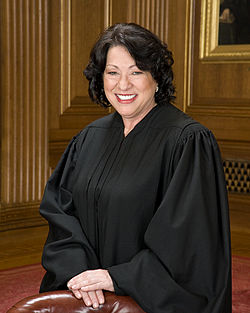| Type | Case | Citation | Issues | Joined by | Other opinions |
|---|
401
| Correll v. Florida | 577 U.S. 948 (2015)
| Eighth Amendment • death penalty | | |
| Sotomayor dissented from the Court's denial of certiorari and application for stay of execution. |
402
| Mullenix v. Luna | 577 U.S. 20 (2015)
| Fourth Amendment • use of deadly force in effecting arrest • qualified immunity | | |
|
503
| Holiday v. Stephens | 577 U.S. 999 (2015)
| death penalty • appointment of counsel in clemency proceedings | | |
| Sotomayor filed a statement respecting the Court's denial of certiorari. |
104
| Hurst v. Florida | 577 U.S. 92 (2016)
| death penalty • Sixth Amendment • right to a jury trial • judicial factfinding of aggravating circumstances after jury advisory recommendation | Roberts, Scalia, Kennedy, Thomas, Ginsburg, Kagan | |
|
405
| Kansas v. Carr | 577 U.S. 127 (2016)
| Eighth Amendment • death penalty • jury instructions on standard of proof for mitigating factors | | |
|
206
| Brooks v. Alabama | 577 U.S. 1115 (2016)
| death penalty | Ginsburg | |
| Sotomayor concurred in the Court's denial of a stay of execution and a petition for certiorari. |
107
| Lockhart v. United States | 577 U.S. 347 (2016)
| federal child pornography laws • scope of sentence enhancement for prior convictions | Roberts, Kennedy, Thomas, Ginsburg, Alito | |
|
108
| Americold Realty Trust v. ConAgra Foods, Inc. | 577 U.S. 378 (2016)
| diversity jurisdiction • citizenship of investment trust | Unanimous [2] | |
|
209
| Hughes v. Talen Energy Marketing, LLC | 578 U.S. 167 (2016)
| Federal Power Act • interstate wholesale electricity rates • federal preemption | | |
|
410
| Ocasio v. United States | 578 U.S. 306 (2016)
| Hobbs Act • conspiracy | Roberts | |
|
111
| Husky Int'l Electronics, Inc. v. Ritz | 578 U.S. 355 (2016)
| bankruptcy law • Chapter 7 • discharge exception for actual fraud | Roberts, Kennedy, Ginsburg, Breyer, Alito, Kagan | |
|
212
| Zubik v. Burwell | 578 U.S. 410 (2016)
| Affordable Care Act • contraceptive mandate • Religious Freedom Restoration Act of 1993 | Ginsburg | |
|
413
| Kernan v. Hinojosa | 578 U.S. 416 (2016)
| habeas corpus • state court unexplained denial of petition | Ginsburg | |
|
214
| Betterman v. Montana | 578 U.S. 450 (2016)
| Sixth Amendment • Speedy Trial Clause • postconviction delay in sentencing | | |
|
415
| Luna Torres v. Lynch | 578 U.S. 473 (2016)
| immigration law • removal for conviction of aggravated felony | Thomas, Breyer | |
|
116
| Green v. Brennan | 578 U.S. 547 (2016)
| Title VII • constructive discharge • statute of limitations | Roberts, Kennedy, Ginsburg, Breyer, Kagan | |
|
217
| Adams v. Alabama | 578 U.S. 998 (2016)
| Eighth Amendment • mandatory life imprisonment of minors • retroactivity of new constitutional rules | Ginsburg | |
| Sotomayor concurred in the Court's decision to grant certiorari, vacate the lower court's opinion, and remand. |
118
| Simmons v. Himmelreich | 578 U.S. 621 (2016)
| Federal Tort Claims Act • exceptions for discretionary functions • judgment bar against subsequent suit against employees | Unanimous [2] | |
|
119
| Dietz v. Bouldin | 579 U.S. 40 (2016)
| district court recall of jury in civil case after discharge | Roberts, Ginsburg, Breyer, Alito, Kagan | |
|
420
| Puerto Rico v. Franklin Cal. Tax-Free Trust | 579 U.S. 131 (2016)
| bankruptcy law • preemption of municipal bankruptcy laws • Puerto Rican government-debt crisis | Ginsburg | |
|
421
| Utah v. Strieff | 579 U.S. 243 (2016)
| Fourth Amendment • exclusionary rule • attenuation doctrine | Ginsburg (in part) | |
|
322
| Birchfield v. North Dakota | 579 U.S. 479 (2016)
| Fourth Amendment • search incident to arrest • drunk driving • implied consent to breathalyzer or blood alcohol content tests | Ginsburg | |
|
